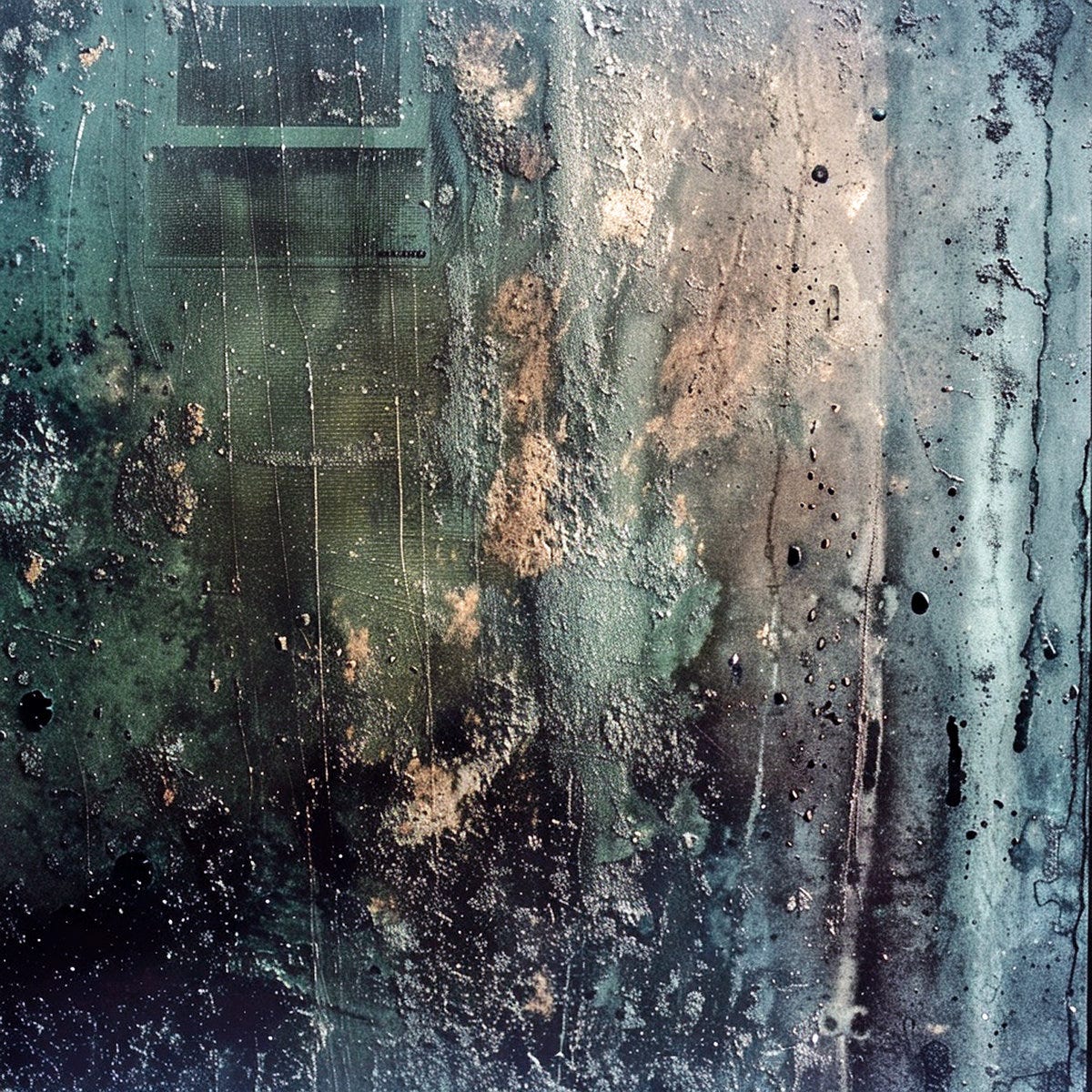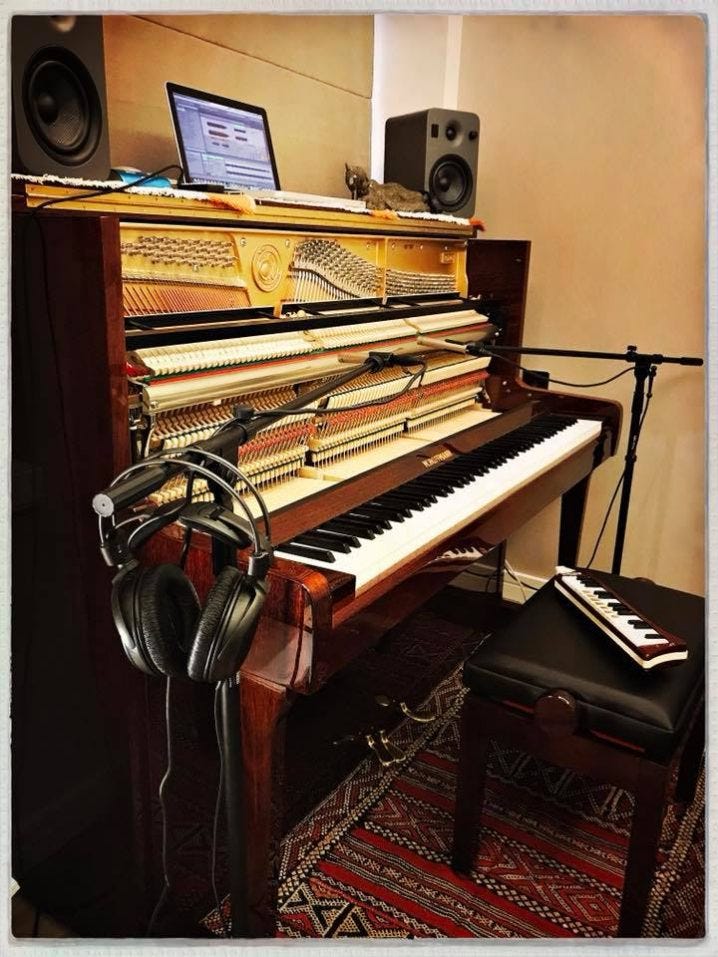Mike Lazarev: il Lo-fi dell’Invisibile | The Lo-fi of the Invisible
'Tarnished Tapes and Saturated Signals' - Dronarivm 2025 recensione/review **ita/en text
This is not my photo – it’s a character I have chosen to represent my music. Mike Lazarev
C’è un suono che arriva da lontano, dai margini consumati del ricordo . Un fruscio che somiglia al tempo quando si sgretola piano, quando non pretende più di essere misura, ma semplice traccia. Quel suono porta la firma di Mike Lazarev, artigiano della nostalgia, architetto del silenzio sonoro.
Nato in Ucraina, cresciuto tra gli Stati Uniti e ora stabilmente a Londra, Lazarev vive la musica come gesto intimo e necessario. La sua è una discografia fatta di piccoli mondi raccolti, costruiti lentamente, nel cuore della notte. Pianista classico per formazione, ambientista per inclinazione dell’anima, ha scelto di ridurre, sottrarre, lasciare spazio: ‘spatial and reductionist pianism’, così ama definire il proprio stile, in bilico tra suono e assenza.
Con ‘Tarnished Tapes and Saturated Signals’, pubblicato da Dronarivm a maggio, Lazarev apre un nuovo capitolo nella sua indagine sonora. Un lavoro che prosegue idealmente quanto seminato in Sacred Tonalities (Past Inside the Present, 2023), ma con un respiro più largo e una malinconia ancora più consapevole. Il titolo è già dichiarazione poetica: “Nastri Ossidati E Segnali Saturi” evocano l’idea di una memoria che si distorce, di un tempo che si piega, si rompe, ma continua a parlare.
‘Tarnished Tapes and Saturated Signals’ cover
Le tracce scorrono come i nastri di cassette dimenticate nel cruscotto di un’auto, ritrovate per caso in un’estate che non sapeva ancora di essere l’ultima. Il lo-fi non è qui una moda, ma un’urgenza espressiva: i rumori, i respiri, i ronzii domestici non sono difetti da mascherare, bensì presenze da accogliere. Ogni brano è un tentativo di conservazione emotiva, una forma di restauro dell’effimero. Lazarev lavora con il suono come si lavora con le fotografie: ne accetta i bordi sfumati, ne esalta le bruciature, ne custodisce le imperfezioni.
Il suo pianoforte, un W. Hoffman verticale scelto con pazienza certosina, diventa quasi un oggetto mistico. Non c’è virtuosismo, non c’è narrazione. C’è solo un dialogo fragile tra le dita e il tempo, tra il tocco e il vuoto. Ogni nota è lasciata vibrare fino a spegnersi, ogni pausa è una confessione sussurrata. In mezzo, interferenze, suoni ambientali, brevi frammenti di realtà che si mescolano alla musica senza più un confine netto.
Il lavoro di mastering di James Murray è chirurgico e poetico al tempo stesso: nulla viene levigato, tutto resta esattamente dove deve stare, con la dignità che spetta alle cose vissute.
Ascoltare ‘Tarnished Tapes and Saturated Signals’ è un atto di abbandono. È come entrare in una stanza buia dove qualcuno ha lasciato acceso un vecchio registratore, su cui fluttuano appunti sparsi, sogni non detti, frammenti d’amore e solitudine. Non c’è un messaggio chiaro, ma c’è un’intenzione profonda: condividere la vertigine dell’essere umani, l’incertezza dolce e tagliente di esistere in un mondo che dimentica.
Lazarev non cerca di restituire, dare, offre domande. E in questo suo lasciarci soli con ciò che resta, fa qualcosa di raro: ci invita a ricordare. Non ciò che è successo, ma ciò che abbiamo provato.
Un disco da ascoltare con le luci spente, nel cuore della notte o in quella mezz’ora sospesa prima dell’alba. Con le cuffie giuste, e il cuore un po’ sbilanciato perché questo è un album che non pretende nulla, ma restituisce tutto.
In un tempo che confonde rumore con presenza, Mike Lazarev continua a fil di voce. Chi saprà restare in silenzio abbastanza a lungo, lo sentirà.
There is a sound that comes from afar, from the worn folds of memory. A faint crackle, like time breaking down quietly, no longer something to be measured, but simply a trace. That sound carries the name of Mike Lazarev: a craftsman of nostalgia, an architect of sonic stillness.
Born in Ukraine, raised in the United States, now settled in London, Lazarev has always approached music as something intimate, essential. His is a discography made of small, self-contained worlds, assembled patiently in the quiet hours, often in the dim solitude of his own living room. Classically trained yet instinctively ambient, he has long chosen the path of subtractions, space over density, essence over display. He calls it “spatial and reductionist pianism”, a self-coined label that perfectly reflects his devotion to sound as breath, not performance.
With ‘Tarnished Tapes and Saturated Signals’, released by Dronarivm, Lazarev opens a new chapter in his sonic journey. A natural continuation of ‘Sacred Tonalities’ (Past Inside the Present, 2023), this latest work reaches for wider cinematic breadth, yet carries an even deeper melancholy. The title itself is a poetic declaration: tarnished tapes, saturated signals, it evokes a memory already half-erased, a time warped by heat and wear, yet still singing softly in the background.
These tracks move like old cassettes forgotten in the glove compartment of a car, found again during the last summer you didn’t yet know would be your last. Lo-fi here isn’t an aesthetic choice, it’s a form of emotional truth. The noise, the breathing, the apartment hum: none of it is a flaw. All of it is presence. Every piece feels like an attempt to hold on, not to a sound, but to a feeling already slipping away.
Lazarev writes with memory more than with hands. Each note and silence is a small confession, every resonance a way to say what can’t be spoken. His piano, a carefully chosen W. Hoffman upright, is never forced, only listened to. It becomes a vessel, a partner in dialogue. There’s no virtuosity here, no narrative arch. Just a fragile connection between fingers and time, tone and void.
Throughout the album, you can feel a tension between the desire to preserve and the inevitability of loss. The music doesn’t try to escape time, it inhabits its decay. Like faded photographs, these pieces reveal their beauty through wear: a sonic patina, an audible vulnerability. You don’t just hear the music, you overhear it, as if it were unfolding in the next room, half-aware of your presence.
The mastering, handled with care by James Murray, enhances this delicately imperfect texture. Nothing is polished; everything is left exactly as it should be, touched, lived, true.
Listening to ‘Tarnished Tapes and Saturated Signals’ is a quiet act of surrender. It’s like entering a room where an old tape recorder has been left running, catching fragments of dreams, stray thoughts, the residue of love and solitude. There’s no clear message here, only a deep, patient intention: to share the unease of being human, and the gentle weight of remembering.
Lazarev doesn’t try to hold on, he gives back. He offers no answers, only space. And in this generous absence, we find something rare: not a story, but a feeling. Not clarity, but resonance.
A record to be heard in darkness, in the hour before dawn, or deep in the night when everything else has gone quiet. With the right headphones, and a slightly unbalanced heart. A work that asks for nothing, and gives everything.
In an age that confuses noise with presence, Mike Lazarev continues to speak in a whisper. Only those who know how to be still will truly hear him.







